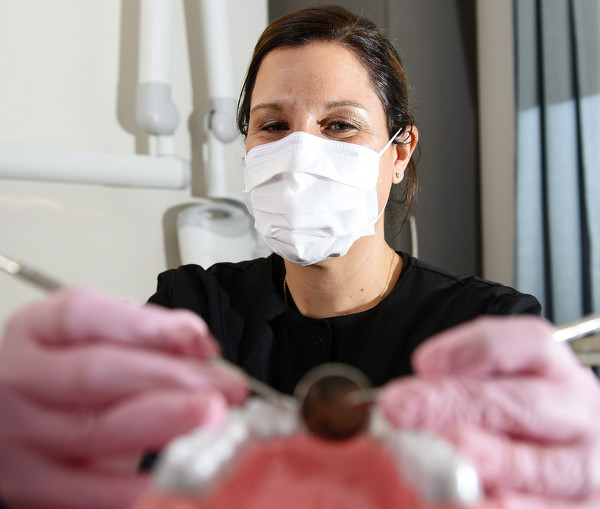Friday, December 4th, 2020
Stressed out
Dentists, doctors seeing, treating many issues related to 2020-induced anxiety
By Leslie Gartrell

Photo by Dan Melograna/The Daily Standard
Dr. Sarah Willmann of Willmann Dental in Celina has seen an increase in dental problems related to stress, such as patients grinding teeth and tooth fractures from their clenching their jaws.
CELINA - This year has been stressful for many area residents. For some, it's led to more trips to the dentist or doctor's office.
"I would definitely say I have noticed an increase in tooth fractures, people grinding/clenching their teeth," said Dr. Sarah Willmann, DDS, primary practitioner at Willmann Dental's Celina office. "We have had a few people break off front teeth, and I told them they were lucky it was now since they have to wear a mask."
Bruxism is the technical name for teeth grinding. People may unconsciously clench their teeth while they're awake or clench or grind them at night when they sleep.
Willmann said the number of patients complaining of jaw pain, issues related to bruxism and other issues is "definitely an increase" over what she typically sees.
"Bruxism and clenching are typically caused by stress, and people are definitely a little more stressed right now," she said.
Patients who have struggled in the past are also experiencing flare-ups.
"People who typically have issues with their jaws because of stress are noticing more problems," she said.
Willmann, who's been in practice since 2009, speculated some issues could be from people wearing their mask and posturing their lower jaw forward or backward so they can breathe more easily.
"For someone with random new tooth pain … typically the question I now ask first (is), 'Do you feel like you are clenching or grinding your teeth more because of stress from COVID-related issues? Do you notice anything different with how you hold your lower jaw when you are wearing mask?'" she said. "I find myself doing this occasionally myself, which is why I also started asking people about how they feel they breathe while wearing the mask."
Dr. Dawn McNaughton, a primary care physician with Grand Lake Primary Care in St. Marys and chief medical officer of Grand Lake Physician Practices at Joint Township District Memorial Hospital, has also seen an increase in appointments specifically related to stress.
McNaughton has had more patients schedule appointments for anxiety, insomnia and headaches related to stress. Some people with chronic diseases, such as diabetes, have had less control over their disease due to stress.
"People have an incredible amount of stress, and the coping mechanisms people would usually use … they've fallen out of their habits," she said.
McNaughton, who has been in practice for more than 20 years, has seen more people abandon healthy habits and take up unhealthy ones. Some people have turned to food for comfort or have eaten more unhealthy foods, and others aren't as active as they used to be or have stopped exercising.
Some elderly patients have had a decline in their mental health due to a lack of socialization, while others have struggled with a lack of a regular schedule. Some people have experienced difficulty with substance abuse.
"That can throw things out of control because they don't have their normal healthy habits," she said.
Dr. John Terpstra, an emergency medicine physician and chief of staff at Mercer County Community Hospital, Coldwater, echoed the sentiments of Willmann and McNaughton.
"I completely agree with the increased stress secondary to COVID," he said.
However, people can take steps to prevent stress-related health problems.
Willmann said people who find themselves clenching their jaws or grinding their teeth during the day can chew on some sugar-free gum if they don't have any existing jaw issues.
"I also suggest sugar-free candy," she said. "I tell the patient they are more likely to roll the candy around with their tongue or chew on the gum then clench their teeth."
"Oftentimes people aren't even aware they are clenching/bruxing until we bring it up," Willmann continued. "Try to relax, take some yoga breaths, roll your shoulders, whatever you can do to relax."
If people find themselves having persistent issues with bruxism during the day, Willmann suggested they use a nighttime mouthguard. People can purchase mouthguards over the counter at most drugstores and some supermarkets.
McNaughton said if people are feeling overwhelmed they can call the county's 24/7 "hopeline" at 800-567-HOPE or text "4hope" to 741741.
"If you're feeling overwhelmed, reach out," she said. "Talking to friends over the phone can help. Talking to those people on the phone or FaceTiming them as a sounding board to voice your anxiety or fears can even help."
People who are struggling with their mental health should see their doctor, she said, noting that many practitioners offer virtual or in-person appointments.
McNaughton suggested people take traditional steps to improve their health, such as eating well-balanced meals, exercising for 30 minutes a day and going to bed at the same time every night. Taking breaks throughout the day and stretching can also help.
"This is our new normal, so we have make a new normal," she said. "The biggest thing I want people to do is to keep taking care of (themselves)."
McNaughton also suggested visiting the Ohio Department of Health's website at coronavirus.ohio.gov for more information on available resources and guidance.



